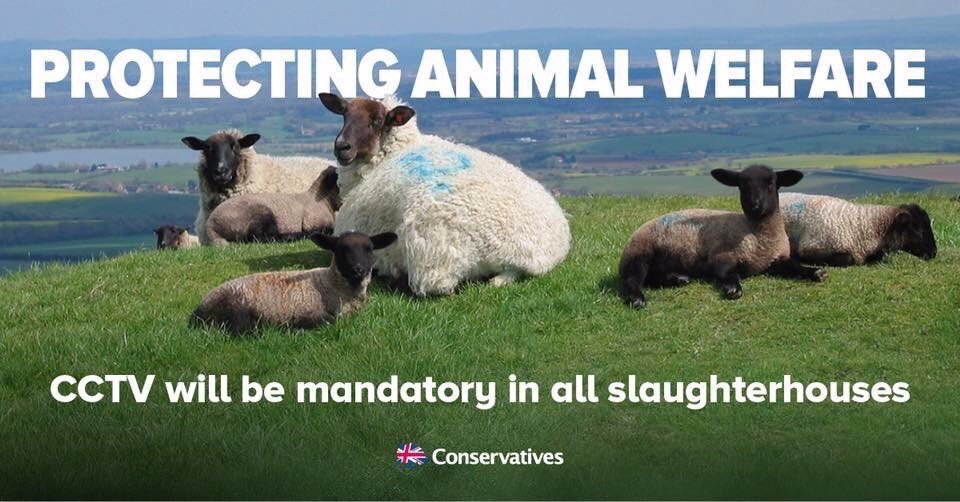
CCTV in slaughterhouses: Legislation laid in Parliament
CCTV to become mandatory in all slaughterhouses in England under new legislation laid in Parliament
Legislation to make CCTV cameras mandatory in slaughterhouses in England to safeguard animal welfare has been laid on (23 February) by Environment Secretary Michael Gove.
The legislation will come into effect from May 2018, once it passes through Parliament, at which point businesses will have six months to comply.
In August 2017, the Secretary of State launched a consultation on the plans to deliver a manifesto commitment for CCTV to be required in every slaughterhouse in England in all areas where live animals are present, with unrestricted access to footage for Official Veterinarians – reassuring consumers that high welfare standards are being effectively enforced.
A summary of responses published in November showed that of almost 4,000 respondents, more than 99% were supportive of the plans.
Environment Secretary Michael Gove said:
We have some of the highest animal welfare standards in the world and want to cement our status as a global leader by continuing to raise the bar.
Introducing compulsory CCTV cameras in slaughterhouses is a further demonstration to consumers around the world that as we leave the EU, we continue to produce our food to the very highest standards.
The previous reaction to the consultation highlighted the strength of feeling among the public that all animals should be treated with the utmost respect at all stages of life and be subject to the highest possible welfare standards.
The proposals will also give the Food Standards Agency’s (FSA) Official Veterinarians (OVs) unfettered access to the last 90 days of footage to help them monitor and enforce animal welfare standards.
The FSA has strict processes in place for the approval of slaughterhouses, and specially trained vets carry out checks to make sure the welfare of animals is protected throughout their time in the slaughterhouse. If breaches are found, a slaughterhouse can be given a welfare enforcement notice, have its staff’s licences suspended or revoked, or be referred for a criminal investigation.
Heather Hancock, Chairman of the Food Standards Agency, said:
I welcome this new legislation being introduced. It will help businesses to improve animal welfare and hygiene standards across the industry.
We look forward to working with the industry as CCTV plans are implemented, and to seeing public confidence rise as a result.
Businesses will have six months to comply with this legislation once it has passed through Parliament. The penalty for failing to comply will be an enforcement notice to the business or prosecution.
Background
- Read the ‘Mandatory Closed Circuit Television (CCTV) recording in slaughterhouses: Summary of responses and Government response’
- For more information on this story, contact the Defra press office on 020 8225 7318.
Legislation to make CCTV cameras mandatory in slaughterhouses in England to safeguard animal welfare has been laid today (23 February) by Environment Secretary Michael Gove.
The legislation will come into effect from May 2018, once it passes through Parliament, at which point businesses will have six months to comply.
In August 2017, the Secretary of State launched a consultation on the plans to deliver a manifesto commitment for CCTV to be required in every slaughterhouse in England in all areas where live animals are present, with unrestricted access to footage for Official Veterinarians – reassuring consumers that high welfare standards are being effectively enforced.
A summary of responses published in November showed that of almost 4,000 respondents, more than 99% were supportive of the plans.
Environment Secretary Michael Gove said:
We have some of the highest animal welfare standards in the world and want to cement our status as a global leader by continuing to raise the bar.
Introducing compulsory CCTV cameras in slaughterhouses is a further demonstration to consumers around the world that as we leave the EU, we continue to produce our food to the very highest standards.
The previous reaction to the consultation highlighted the strength of feeling among the public that all animals should be treated with the utmost respect at all stages of life and be subject to the highest possible welfare standards.
The proposals will also give the Food Standards Agency’s (FSA) Official Veterinarians (OVs) unfettered access to the last 90 days of footage to help them monitor and enforce animal welfare standards.
The FSA has strict processes in place for the approval of slaughterhouses, and specially trained vets carry out checks to make sure the welfare of animals is protected throughout their time in the slaughterhouse. If breaches are found, a slaughterhouse can be given a welfare enforcement notice, have its staff’s licences suspended or revoked, or be referred for a criminal investigation.
Heather Hancock, Chairman of the Food Standards Agency, said:
I welcome this new legislation being introduced. It will help businesses to improve animal welfare and hygiene standards across the industry.
We look forward to working with the industry as CCTV plans are implemented, and to seeing public confidence rise as a result.
Businesses will have six months to comply with this legislation once it has passed through Parliament. The penalty for failing to comply will be an enforcement notice to the business or prosecution.
Background
- Read the ‘Mandatory Closed Circuit Television (CCTV) recording in slaughterhouses: Summary of responses and Government response’
- For more information on this story, contact the Defra press office on 020 8225 7318.
